|
|
|
Sort Order |
|
|
|
Items / Page
|
|
|
|
|
|
|
| Srl | Item |
| 1 |
ID:
163613
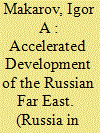

|
|
|
| 2 |
ID:
099575
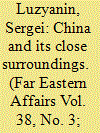

|
|
|
|
|
| Publication |
2010.
|
| Summary/Abstract |
The article analyzes priorities in China's foreign policy. It examines certain aspects of the regional and bilateral relations of the PRC with Japan, North Korea, South Korea, the Russian Federation, Mongolia, Central Asia, ASEAN, India and Pakistan.
|
|
|
|
|
|
|
|
|
|
|
|
|
|
|
|
| 3 |
ID:
111883
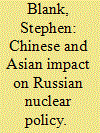

|
|
|
|
|
| Publication |
2012.
|
| Summary/Abstract |
Asia, where nuclear powers already interact (including North Korea), exerts a growing influence on the thinking and policy underlying Russia's current and future nuclear (and overall defense) posture. China's rise is forcing Russia into a greater reliance on strategic offensive weapons and tactical nuclear weapons. These in turn will reinforce its opposition to US missile defenses, not only in Europe but also in Asia. Russia must now entertain the possibility of nuclear use in regional conflicts that would otherwise remain purely conventional. It cannot be postulated blindly that nuclear weapons serve no discernible purpose other than to deter nuclear attacks by other nuclear powers. The strategic equation in Asia and in the Russian Far East convincingly demonstrates the falsity of this approach. Nuclear weapons will be the essential component of Russia's regional defense policy if not of its overall policies - and this also includes contingencies in Europe.
|
|
|
|
|
|
|
|
|
|
|
|
|
|
|
|
| 4 |
ID:
095561
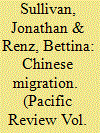

|
|
|
|
|
| Publication |
2010.
|
| Summary/Abstract |
In contrast to Sino-Russian relations at the state-level, regional cooperation between the contiguous Russian Far East and Chinese North East has been difficult to achieve, despite the existence of seemingly natural economic complementarities. This article asks why this is the case and argues that one important stumbling block, i.e. negative reactions to Chinese labour migration, has become less problematic. Situating Russian Far East/Chinese North East relations in a regionalist framework the article compares the salience and framing of major issues in regional relations in Chinese and Russian media at the national and regional levels. Contrary to earlier research, the findings suggest that economic and regional development issues, and not Chinese migration into the Russian Far East, are by far the most salient sets of issues on both sides. However, significant differences in the framing of these issues suggest that a convergence of opinion on the desirability of regional cooperation masks contradictory expectations for the direction of regional development.
|
|
|
|
|
|
|
|
|
|
|
|
|
|
|
|
| 5 |
ID:
082255
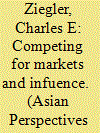

|
|
|
|
|
| Publication |
2008.
|
| Summary/Abstract |
This article discusses the asset acquisitions of Asian national oil companies (NOCs) in the energy-rich states of Russia and Central Asia, and considers the implications for economic and geopolitical stability. Asian NOC investment in these countries is analyzed in terms of state-level political and economic relations, as well as the regional and local impact of NOC activity on the host country. Asian NOCs, and the governments that support them, face few political obstacles in dealing with Eurasia's authoritarian regimes. Asian companies operate in business cultures similar to those in Eurasia, and have fewer reservations about engaging in bribery or corruption than their Western counterparts. These advantages are offset by the entrenched position of Western and Russian oil companies, and a strong commitment of the host states to political and economic independence
|
|
|
|
|
|
|
|
|
|
|
|
|
|
|
|
| 6 |
ID:
086013
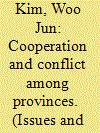

|
|
|
|
|
| Publication |
2008.
|
| Summary/Abstract |
The development of cooperative relations between provinces in Northeast Asia has been reinforced by the global trend toward localization and decentralization. The relationship between China's three northeastern provinces and the Russian Far East may be seen as a mixture of cooperation and conflict.
|
|
|
|
|
|
|
|
|
|
|
|
|
|
|
|
| 7 |
ID:
110055
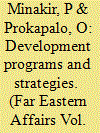

|
|
|
|
|
| Publication |
2011.
|
| Summary/Abstract |
This article gives a retrospective analysis of large-scale programs of regional development implemented on the territory of the Russian Far East beginning from the 1930s. A conclusion has been drawn that "dif-fuseness" of targets and/or "atomism" of financial resources leads to failure of programs. An analysis of the strategy of the socio-economic development of the Far East and the Baikal region up to 2025 has revealed the lack of concrete tasks and the need to revise the document.
|
|
|
|
|
|
|
|
|
|
|
|
|
|
|
|
| 8 |
ID:
175944
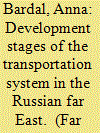

|
|
|
|
|
| Summary/Abstract |
This paper concerns the process of Russia's Far East transportation system development since the middle of the 17th century in the context of economic development of the region. The classification presented by the author includes thirteen stages of the transportation system development, taking into account the general economic goals, economic needs, and the scale of foreign economic interactions. The classification marks three stages of decline due to political events, limited economic resources, and structural reform, respectively.
|
|
|
|
|
|
|
|
|
|
|
|
|
|
|
|
| 9 |
ID:
189865
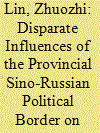

|
|
|
|
|
| Summary/Abstract |
The resurgence of sovereign states in a highly globalized modern world calls
for new approaches to border studies. The present paper suggests looking
at political, sociocultural and economic borders as constructs of dynamic
boundaries influencing people’s interactions. Through an oral history of a
mixed Sino-Russian ethnic community, and a narrative review of smugglers
and shuttle traders, this study examines how the flux of the political border
between the Heilongjiang1 province and the Russian Far East (HLJ-RFE political border) changed the sociocultural and economic borders during
three periods: the 1910s-1920s, the 1960s-1970s, and the 2000s-2010s, when
the political border was characterized as being porous, hostile, and friendly,
respectively. The study shows that the HLJ-RFE political border had a strong
impact on limiting the sociocultural demarcation, but a much weaker effect on
facilitating sociocultural interactions and economic regulations. The results
of the study demonstrate how a strong and friendly political border may lose
its potency when utilized by the local government to facilitate interethnic
integration. Furthermore, the study warrants an interdisciplinary approach to
border studies and a region-oriented methodology.
|
|
|
|
|
|
|
|
|
|
|
|
|
|
|
|
| 10 |
ID:
111791
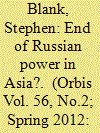

|
|
|
| 11 |
ID:
146279
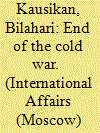

|
|
|
|
|
| Summary/Abstract |
THERE IS A STORY, possibly apocryphal, that while briefing Richard Nixon for his 1972 visit to China, Henry Kissinger told the President that Zhou Enlai was an avid student of French history. During his trip, Nixon met Zhou in the Forbidden City. As they strolled together through the gardens, Nixon remembered Kissinger's comment and asked Zhou what he thought had been the influence of the French Revolution on western civilization. Zhou paused for thought, then replied: "Too early to tell." Similarly it could well be too early to tell what the end of the Cold War means for the international system. But at least the broad outlines of some of the main issues may now be glimpsed.
|
|
|
|
|
|
|
|
|
|
|
|
|
|
|
|
| 12 |
ID:
110352
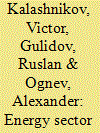

|
|
|
|
|
| Publication |
2011.
|
| Summary/Abstract |
This article describes the Russian Far East's energy sector, stressing its limited energy exports, and use of separate electricity and heating grids to geographically dispersed population centers with various supply patterns distributed across a vast territory. One key strategic trend has been to strengthen the potential of the region as an energy supplier for the countries of Northeast Asia. This underlies the framework used to develop three energy scenarios of the Russian Far East's energy future through 2030: Reference, National Alternative and Regional Alternative. While the Regional Alternative case has much greater total costs for implementation, yields almost the same amount of emissions as the BAU case, and requires greater governmental efforts to bring it to reality, it looks preferable for the RFE as a whole because it has a well-balanced primary energy consumption mix, lower energy and ecology/GDP indices, and a lower fraction of energy imports; offers greater diversity of energy supply; and provides better local energy service. The authors would like to thank Boris Saneev, Alexander Sokolov, Alexander Izhbuldin from the Institute of Energy Systems, Irkutsk; Julia Savelieva from Far Eastern Coal Research; and Alla Filatova from Far Eastern Power Engineering Institute for providing technical information, and expertise.
|
|
|
|
|
|
|
|
|
|
|
|
|
|
|
|
| 13 |
ID:
118590
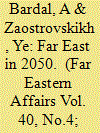

|
|
|
|
|
| Publication |
2012.
|
| Summary/Abstract |
This article is based on the findings of comprehensive research undertaken at the RAS FEB Institute for Economic Studies (IES).1 The authors have set out to explore possible development options of transportation infrastructure in Russia's Far Eastern region as a key economic sector with a role to play in tapping the potential of international cooperation in the period until 2050.
|
|
|
|
|
|
|
|
|
|
|
|
|
|
|
|
| 14 |
ID:
075352
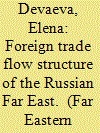

|
|
|
| 15 |
ID:
070545
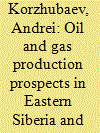

|
|
|
| 16 |
ID:
147336
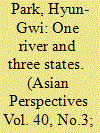

|
|
|
|
|
| Summary/Abstract |
In this article, I address the contradictions and paradoxes inherent in the development of the Tumen River triangle area. After briefly examining the history and background of the international development project, I explore how it has been implemented and the problems it has faced in the Russian Far East and North Korea, in contrast with its relatively successful development in China. My argument is that the core concept in Tumen River development became closely interlinked with the local variants of postsocialist transition. The difficulties created by Russia and North Korea derive from the dismantling of their state economies, which paradoxically has led to a preoccupation with sovereignty rather than the pursuit of a market economy.
|
|
|
|
|
|
|
|
|
|
|
|
|
|
|
|
| 17 |
ID:
091770
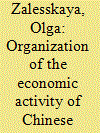

|
|
|
|
|
| Publication |
2009.
|
| Summary/Abstract |
In the 1920-1930s, the economic activity of Chinese migrants living in the Far East of Russia was essentially reorganized. Chinese workers were drawn in trade unions and cooperatives. This article describes the specific features of the trade union and cooperative movement among Chinese migrants and analyzes the role of cooperatives and trade unions in the integration of Chinese migrants in the socio-economic life of the Soviet Far East.
|
|
|
|
|
|
|
|
|
|
|
|
|
|
|
|
| 18 |
ID:
101676
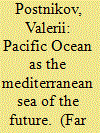

|
|
|
|
|
| Publication |
2010.
|
| Summary/Abstract |
This article examines the formula "The Pacific Ocean is the Mediterranean Sea of the future," which was quite widely known in Russia in the early 20th century as a call for a stronger presence in the Pacific Ocean. We trace the 19th century formation of this idea, associated with the names of Aleksander Hertzen, Lev Mechnikov, and the classical works of global geopolitics. The author concludes that representatives of Russian social and political thought were among the first ideologues of Asia-Pacific cooperation.
|
|
|
|
|
|
|
|
|
|
|
|
|
|
|
|
| 19 |
ID:
175943
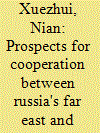

|
|
|
|
|
| Summary/Abstract |
Since 2012, Russia is accelerating the pace of the Far East development. Preferential regimes for attracting investments, such as Priority Development Area (PDA), The Free Port of Vladivostok, etc. were developed and launched. At the same time, the Northeast Asian countries put forward a number of new state strategies in the sphere of international cooperation: The One Belt, One Road initiative, the New Northern Policy, the Nine Bridges, and the Eight-Point Cooperation Plan. The interlocking of these strategies gave a new impetus to the priority development of the Russian Far East.
|
|
|
|
|
|
|
|
|
|
|
|
|
|
|
|
| 20 |
ID:
183443


|
|
|
|
|
| Summary/Abstract |
This article deals with cooperation between the U.S.S.R. and China in the field of railroad transportation in the 1950s-1960s using the example of freight traffic via Grodekovo station, Khabarovsk Territory, and Zabaikalsk station, Chita Region. The role of Far Eastern and Trans-Baikal Railroads in the U.S.S.R.-China transportation corridor is shown. The author uses statistical data from the State Archives of Khabarovsk and Primorye Territories to confirm the conclusions made earlier by researchers concerning the Soviet-Chinese transportation system in Transbaikalia. Both sides of the transit by rail freightage (U.S.S.R. and PRC) needed raw materials and mutually complemented each other. The author notes the work of international supervisory bodies - meetings of representatives of railroads and foreign trade organizations of socialist countries of Southeast Asia - to coordinate the plans of export-import cargo transportation.
|
|
|
|
|
|
|
|
|
|
|
|
|
|
|
|
|
|
|
|
|